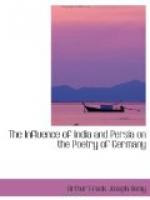In his Weihgesaenge (vol. ii. p. 149) Schack sends a greeting to the Orient; in another one of these songs he sings the praises of India (ibid. p. 232), and in still another he apostrophizes Zoroaster (ibid. p. 133). A division of this volume (ii.) bears the title Lotosblaetter. The sight of the scholar’s chamber with its Sanskrit manuscripts makes him dream of India’s gorgeous scenery and inspires a poem “Das indische Gemach” (vol. x. p. 26).
Oriental stories and legends are also offered, though not frequently. “Mahmud der Gasnevide” (vol. i. p. 299) relates the story of the great sultan’s stern justice.[235] “Anahid” (vol. vii. p. 209) gives the famous legend of the angels Harut and Marut, who were punished for their temptation of the beautiful Zuhra, the Arabic Venus.[236] Schack has substituted the old Persian name of Anahita (mod. Pers. nahid) for the Arabic name, and has otherwise also altered the legend considerably.
Schack never attempted to write original poems in Oriental form. The Hafizian movement did not excite his enthusiasm, and for the trifling of the average Hafizian singer he had no use whatever. In a poem by which he conveys his thanks to the sultan for a distinction which the latter had conferred on him he says:
Waer ich, so wie Firdusi, paradiesisch,
Ich bohrte dir die Perlen der Kaside
Und schlaenge dir das Halsband der Ghasele;
Allein wir Deutschen singen kaum hafisisch,
Und wenn wir orientalisch sind im Liede,
Durchtraben wir die Wuesten als Kamele. (Vol. x. p. 106.)
Even for Bodenstedt’s Mirza Schaffy songs he has no great admiration:
Gar
viel bedeutet’s nicht, mich duenkt!
Dem nur, was Rueckert laengst
schon besser machte
Und Platen, bist du keuchend
nachgehinkt. (Vol. x. p. 47.)
FOOTNOTES:
[230] Stimmen vom Ganges. Eine Sammlung Indischer Sagen, 2 Auflage, Stuttgart, 1877. The first edition appeared in 1857. There the eleventh story was Yadu’s Meerfahrt (from Harivamsa). In the second edition this was omitted and an imitation of the Nalodaya substituted as an appendix. The sources for each poem are given by the author himself in Nachwort, p. 215, note.
[231] Op. cit. p. 216.
[232] See Lanman, The Milk-drinking Hansas of Sanskrit Poetry, JAOS. vol. 19. 2, pp. 151-158. Goose would be a better translation of the word hamsa than swan.
[233] We cite from the edition mentioned on p. vii.
[234] Strophen des Omar Chijam, Stuttg. 1878. The translation itself dates from an earlier period than the year of publication. The author, speaking of the delay in bringing it before the public, states that Horace’s nonumque prematur in annum could be applied in threefold measure to this work (p. 118). Hence the translation was made about 1850, or a little later.




